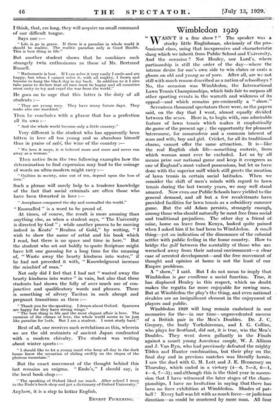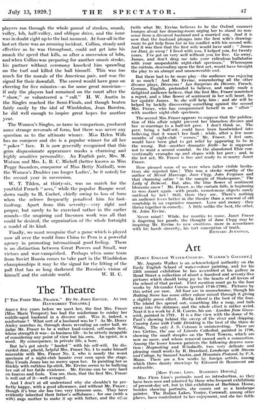Wimbledon 1929
" WASN'T it a fine show ? " The speaker was a stocky little Englishman, obviously of the pro- fessional class, using that inexpressive and characteristic slang which we inherit from Public School and University. And the occasion ? Not Henley, nor Lord's, where partisanship is still the order of the day—where the intense desire for one's own side to win elates or casts a- gloom on old and young as of yore. After all, are we not still with much reason described as a nation of schoolboys ?- No, the occasion was Wimbledon, the International. Lawn Tennis Championships, which bids fair to surpass all- other sporting events in the warmth and wideness of its appeal—and which remains pre-eminently a " show."
Seventeen thousand spectators there were, so the papers said, on the day that I went, almost equally divided between the sexes. Here is, to begin with, one admirable- feature of lawn tennis which makes it emphatically the game of the present age ; the opportunity for pleasant intercourse, for camaraderie and a common interest of man and wife, boy and girl. Cricket, for all its traditional - charm, cannot offer the same attraction. It is--like the real English club life—something esoteric, from which woman must ever be excluded. Let us by all means prize our national game and keep it evergreen as one of England's most valued possessions, but let us have_ done with the superior sniff which still greets the mention of lawn tennis in certain social latitudes. When we consider the shift of men's minds with regard to lawn tennis during the last twenty years, we may well stand amazed. Now even our Public Schools have yielded to the general demand, and all but a few recalcitrants have provided facilities for lawn tennis as a subsidiary summer game. But the old Adam persists, strangely enough,. among those who should naturally be most free from social and traditional prejudices. The other day a friend of, mine, home on leave from Kenya, looked quite pained when I asked him if he had been to Wimbledon. A small thing--yet an indication of the dissonance of the colonial. settler with public feeling in the home country. How to bridge the gulf between the mentality of those who are wrenched away from their natural environment—a clear case of arrested development—and the free movement of thought and opinion at home is not the least of our Empire problems.
A " show," I said. But I do not mean to imply that Wimbledon is par excellence a social function. True, it has displaced Henley in this respect, which no doubt, makes the regatta far more enjoyable for rowing men. But at Wimbledon the play's the thing, and even national , rivalries are an insignificant element in the enjoyment of. players and public.
Wimbledon 1929 will long remain enshrined in our memories for the-- in our time--unprecedented success of a British pair in the Men's Doubles. Dr. J. C.. Gregory, the burly Yorkshireman, and I. G. Collins, who plays for Scotland, did not, it is true, win the Men's. Doubles. They went down gallantly in the Finals against a smart young American couple, W. J. Allison and J. Van Ryn, who had previously defeated the mighty, Tilden and Hunter combination, but their play on the, final day and in previous matches was literally heroic. I saw the duel with G. M. Lott and J. E. Hennessey on. Thursday, which ended in a victory (4-6, 7-5, 6-1; 4--6, 7-5) ;-and although this is the third year in succes- sion that I have witnessed the later stages of the cham- pionships, I have no hesitation 'in saying that there has been no finer exhibition at Wimbledon. Shades of pat-, bail ! - Every ball was hit with as much force—or judicious direction—as could be- mustered by mere man. All four players ran through the whole gamut of strokes, smash, volley, lob, half-volley, and oblique drive, and the issue was in doubt right up to the last moment. At four-all in the last set there was an amusing incident. Collins, steady and effective as he was throughout, could not get into his smash the speed that kills, so after a succession of lobs, and when Collins was preparing for another smash stroke, his partner without ceremony knocked him sprawling on the turf and killed the ball himself. This was too much for the morale of the American pair, and was the signal for their downfall. The crowd would have gone on cheering for five minutes—as for some great musician— if only the players had remained on the court after the " show," or volunteered a " call." H. W. Austin in the Singles reached the Semi-Finals, and though beaten fairly easily by the idol of Wimbledon, Jean Borotra, he did well enough to inspire great hopes for another year.
The Women's Singles, so tame in comparison, produced some strange reversals of form, but there was never any question as to the ultimate winner. Miss Helen Wills has no compeer and she is a popular winner for all her " poker " face. It is now generally recognized that this grim dispassionate appearance masks a charming and highly sensitive personality. An English pair, Mrs. M. Watson and Mrs. L. R. C. Michell (better known as Miss Peggy Saunders, conqueror of Miss Betty Nuthall), won the Women's Doubles (no longer Ladies', be it noted) for the second year in succession.
W. T. Tilden, at thirty-six, was no match for the youthful French " aces," while- the popular Basque went down easily to H. Cochet, chiefly owing to loss of form when the referee frequently penalised him for foot- faulting. Apart from this severity--very right and proper, but surely to be exercised rather in the earlier rounds—the umpiring and linesmen work was all that could be desired, the organization of the whole fortnight a model of its kind.
Finally, we must recognize that a game which is played now all over the world from China to Peru is a powerful agency in promoting internationil good feeling. There is no distinction between Great Powers and Small, war victors and war-vanquished. Perhaps when some team from Soviet Russia comes to take part in the Wimbledon championships it may be the signal for the lifting of the pall that has so long darkened the Russian's vision of himself and the outside world. W. H. C.

































 Previous page
Previous page